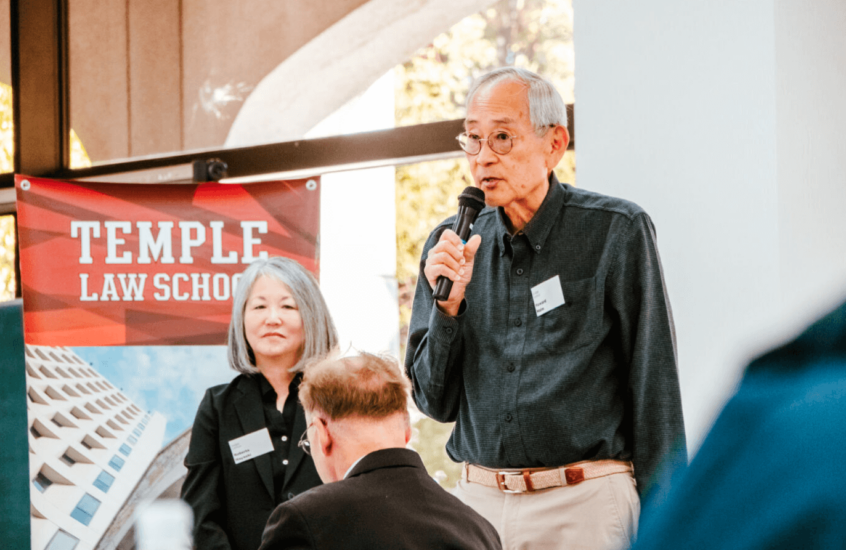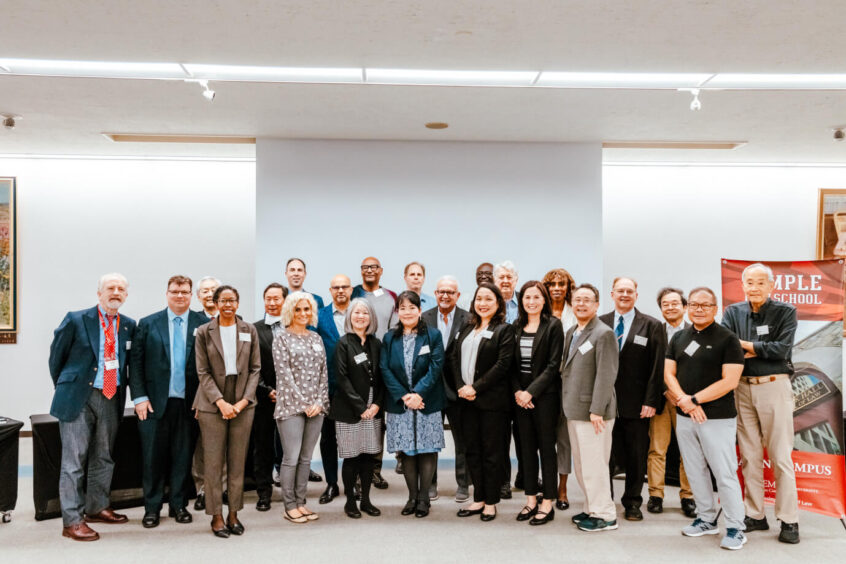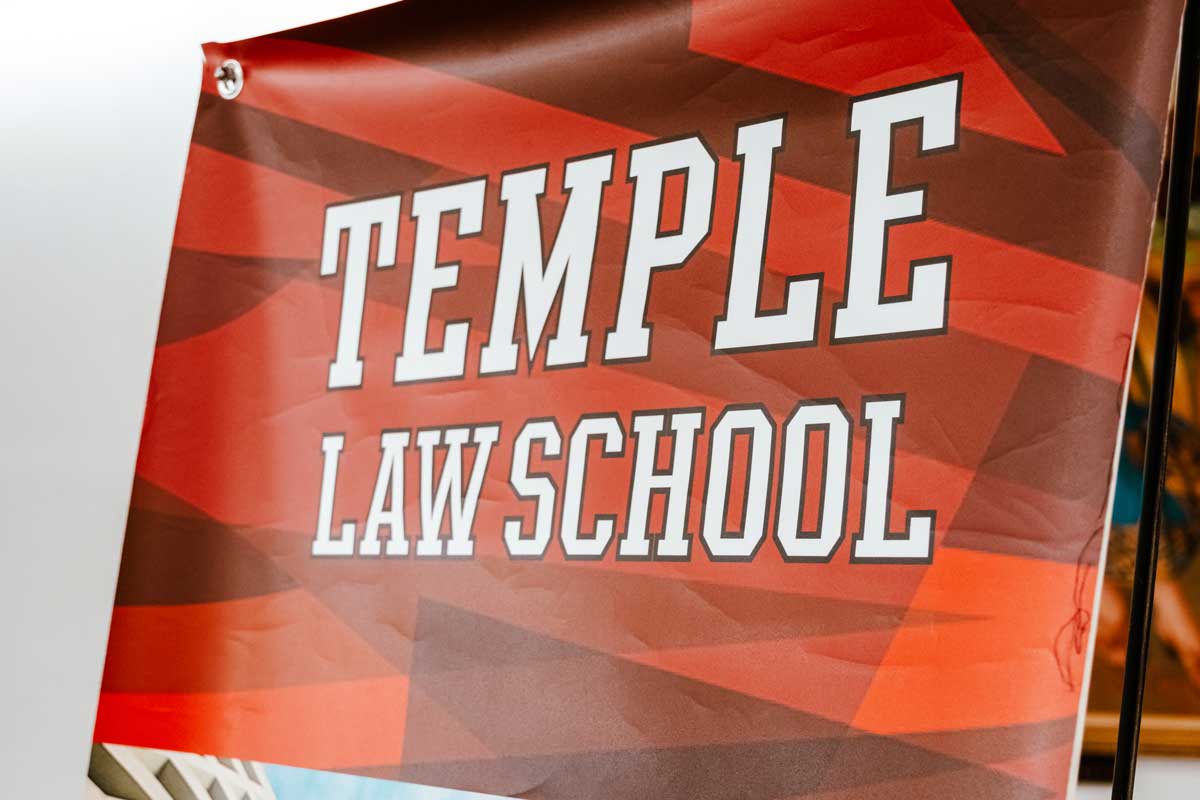A Temple Law School banner displayed at the front desk during the symposium.
The Beasley School of Law at Temple University, Japan Campus (Temple Law Japan) held a two-day symposium in Tokyo that delved into a comparative analysis of the Japanese and U.S. justice systems. The event brought together judges from California state courts and members of the Japanese bar, facilitating an open and insightful dialogue about contemporary challenges encountered by judges and legal practitioners when handling cases in the Japanese and U.S. justice systems.

Taking place on November 9 and November 10, 2023, the symposium attracted a diverse audience, including domestic and international judicial officials, law school professors from Japanese universities, the Japan campus of Temple University (TUJ) faculty, and law school students. Topics included criminal justice, judicial reform and ethics, and the use of jury trials.
The symposium featured prominent speakers, including Tina Saunders, director and associate professor of law of the Beasley School of TUJ; Setsuo Miyazawa, senior visiting professor of law and senior director of the Center for East Asian Legal Studies at UC Law San Francisco; Mari Hirayama, professor of law at Hakuoh University; Daniel Foote, professor of law emeritus at the University of Tokyo; and Leon Wolff, professor of global business law at the Graduate School of Law at Hitotsubashi University, Several judges from California presented, including Justice Carlos Moreno, retired from the Supreme Court of California and former U.S. Ambassador to Belize, California Judges Roberta Hayashi and Jon Takasugi, as well as a judge and staff attorney from the Office of the Secretariat General at the Supreme Court of Japan.
On November 9, the symposium featured three panel discussions at Showa Women’s University, which is located next to TUJ. The first session, “The Criminal Justice Systems in Japan and the U.S.,” delved into Japan’s criminal justice system, including the issue of “hostage justice” and the approach to pretrial release, including bail, compared to the criminal justice system in the U.S.

The second panel, titled “Judicial Reform and Legal Ethics in Japan and the U.S.,” focused on the ethical standards for judges in both countries, their enforcement and the impact of judicial training in Japan. Recent events, including the U.S. Supreme Court inquiry and California State Bar opinions, emphasize the importance of judicial ethics such as judges’ use of social media and reporting attorney misconduct.
The third panel, “The Jury Trial Systems in Japan and the U.S. and the Judge’s Role in Managing Them,” compared the “lay judge” (saiban in) system in Japan to jury trials in the U.S., examining their role in achieving justice, the jury selection process and the challenges faced by judges presiding over jury trials.
On November 10, the final day of the symposium took place at TUJ in a hybrid style, allowing participants to attend in person or online. The session, “Never Forget: Korematsu v. United States and the Incarceration of Japanese Americans,” reflected on the U.S. Supreme Court’s decision to uphold the wartime incarceration of 120,000 Japanese Americans. Judge Roberta Hayashi and Judge Jon Takasugi presented an Emmy Award-winning documentary, Of Civil Rights and Wrongs: The Fred Korematsu Story, and discussed the historical and contemporary significance of the Korematsu cases in the context of government decisions based on race, national origin, or religion.
The Beasley School of Law of Temple University, established in 1895 and accredited by the American Bar Association, offers comprehensive legal education in Philadelphia and globally. In Tokyo, the Temple Law Japan program enables students to earn LLM degrees and certificates without leaving Japan. The school excels in trial advocacy, part-time programs, and international law, consistently earning high rankings. Notably, U.S. News & World Report ranked Temple’s Trial Advocacy program as the No. 2 program among all U.S. law schools in the 2023-2024 edition.
With campuses in Tokyo, Philadelphia, and Rome, Temple Law School has been a pioneer in global legal education. The Tokyo campus, TUJ, is the oldest and largest branch campus of a foreign university in Japan. TUJ started the law program in 1994 and it celebrates its 30th anniversary next year. and TUJ was the first university to be officially designated a “Foreign University, Japan Campus” by Japan’s Ministry of Education, Culture, Sports, Science and Technology in 2005. Committed to accessibility and diversity, Temple Law School prepares students for legal practice, emphasizing professional responsibility and community service. Graduates meet legal education requirements for bar examinations, and the school is ABA-approved, ensuring quality education and recognition by the U.S. Department of Education.
Other related stories
- High-ranking U.S. and Japanese Government Officials Offer Critical Insights During “Diplomacy Week” at Temple University, Japan Campus (October 2, 2023 )
- Dean of Temple Law School Rebouché Visits TUJ for Women’s Health Equity and Corporate Visit (June 15, 2023)
- Astellas Pharma’s Naoki Okamura Gives Lecture on Corporate Financing to TUJ Students of International Business Studies (May 30, 2023)

